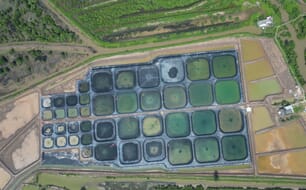However, a recent report in the journal Conservation Biology points out that mariculture is moving in the opposite direction.
For example, in the Mediterranean, production of herbivorous species such as bivalves (mussels and oysters) increased from approximately 2,000 metric tonnes in 1970 to 100,000 metric tonnes in 2004. But at the same time, the mariculture of intermediate predators such as sea bream increased from 20 metric tons in 1983 to 140,000 metric tonnes in 2004, and production of just one top-level predator, the bluefin tuna, has been estimated to have soared from almost nothing in 1986 to 30,000 metric tonnes by 2005.
This latter statistic is particularly significant given that bluefin tuna production is in fact a “fattening” process, in which juvenile tuna are caught, penned and fattened. Stocks of bluefin are threatened, and in September 2007, fishing for the species in the eastern Atlantic and the Mediterranean was halted for the rest of the year because the total allowable catch (29,500 metric tons) had been reached.
Konstantios Stergiou of Aristotle University of Thessaloniki and colleagues argue in their Conservation Biology paper that the “fact that the capacity of tuna farms greatly exceeds the total allowable catch indicates lack of conservation planning in development of the tuna-fattening industry, which, ideally, should have been linked to fisheries management policies, and may lead to illegal fishing.”
They point out that the Mediterranean aquaculture industry is a net fish consumer because the production of high-trophic-level species requires large amounts of animal feed that is derived from small pelagic fishes like sardines and anchovies that humans consume directly.
This raises not only ecological issues but also ethical ones, as large quantities of fish suitable for human consumption are being converted into animal feed for the benefit of a relatively small number of affluent consumers.
Further Reading
| - | Read our recent report, Closed Cycle Bluefin Tuna: New Opportunities Are Born, by clicking here. |





